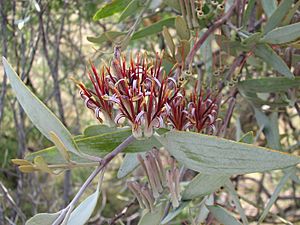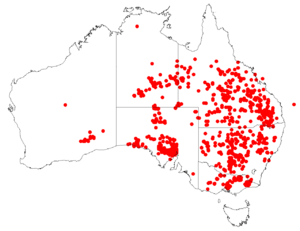Amyema quandang facts for kids
Quick facts for kids Amyema quandang |
|
|---|---|
 |
|
| Scientific classification |
|
| Kingdom: | Plantae |
| Clade: | Tracheophytes |
| Clade: | Angiosperms |
| Clade: | Eudicots |
| Order: | Santalales |
| Family: | Loranthaceae |
| Genus: | Amyema |
| Species: |
A. quandang
|
| Binomial name | |
| Amyema quandang (Lindl.) Tiegh.
|
|
| Varieties | |
|
A. quandang var. quandang |
|
 |
|
| Collections data for A. quandang from the Australasian Virtual Herbarium | |
| Script error: The function "autoWithCaption" does not exist. | |
Script error: No such module "Check for conflicting parameters".
Amyema quandang is a special kind of plant found all over mainland Australia. It's often called the grey mistletoe. This plant is a bit like a hemi-parasite. This means it gets some of its food and water from other plants, but it can also make some of its own food using sunlight. It's very common in the dry, inland parts of Australia.
Contents
What Does it Look Like?
This plant grows as a shrub, but it doesn't have roots in the ground like most plants. Instead, it attaches itself to the stems of other plants, especially a type of tree called Acacia.
Its leaves are tough and feel a bit like leather. They are usually greyish in color. The leaves can be shaped like a spear or a wider oval.
The flowers of Amyema quandang are really colorful! They can be red, green, and grey. You can usually see these flowers between April and October. After the flowers, the plant grows a fruit. This fruit is soft and round, about 6 to 10 millimeters long. Inside, it has an oily seed.
How it Lives and Grows
Amyema quandang has a special relationship with Acacia trees. It uses the Acacia trees to help it grow. Some of the Acacia trees it likes to grow on include A. aneura, A. cambagei, and A. papyrocarpa.
Two types of birds are very important to Amyema quandang. They help each other out in a partnership called mutualism.
- Spiny-cheeked honeyeaters (Acanthagenys rufogularis) love to drink the sweet nectar from the flowers of Amyema quandang. While they are drinking, they help the plant by moving pollen from one flower to another. This helps the plant make seeds.
- Mistletoebirds (Dicaeum hirundinaceum) eat the fruit of Amyema quandang. When they fly to other places, they drop the seeds. This helps the plant spread to new areas. The fruit is available all year, but other birds usually don't eat it.
Sometimes, Amyema quandang can even mix with another type of mistletoe called Amyema pendula. When this happens, they can create new plants that are a mix of both. These are called first-generation hybrids.
Naming and History
Amyema quandang belongs to a group of plants called Santalales, which is the mistletoe order. It's part of the Loranthaceae family.
The first time this plant was written about was in 1838. A scientist named John Lindley described it. He saw it growing on another plant called Santalum acuminatum, which is also a hemi-parasite. This was noted by an explorer named Thomas Mitchell.
Later, in 1894, another scientist named Philippe Édouard Léon Van Tieghem moved this plant into the group (or genus) called Amyema. The name Amyema comes from ancient Greek words that mean 'without' and 'to instruct'.
There are two main types, or varieties, of Amyema quandang. They are called Amyema quandang var. quandang and Amyema quandang var. bancroftii. The bancroftii type is found in places like Queensland and New South Wales.
Host Plants
Amyema quandang can grow on many different types of plants. Here are some of the plant families it has been found on:
- Apocynaceae: Like Carissa ovata
- Caesalpiniaceae: Such as Bauhinia species
- Casuarinaceae: Including Casuarina species
- Cupressaceae: For example, Callitris species
- Euphorbiaceae: Like Mallotus claoxyloides
- Meliaceae: Such as Owenia acidula
- Mimosaceae: This is a big group, including many Acacia species like Acacia aneura, Acacia cambagei, Acacia dealbata, and Acacia papyrocarpa.
- Myoporaceae: For example, Eremophila mitchellii
- Myrtaceae: Like Eucalyptus largiflorens and Melaleuca lanceolata
- Proteaceae: Such as Hakea arborescens
- Rutaceae: Including Flindersia maculosa and Geijera parviflora
- Sapindaceae: Like Alectryon oleifolius
Image Gallery
 | Georgia Louise Harris Brown |
 | Julian Abele |
 | Norma Merrick Sklarek |
 | William Sidney Pittman |






